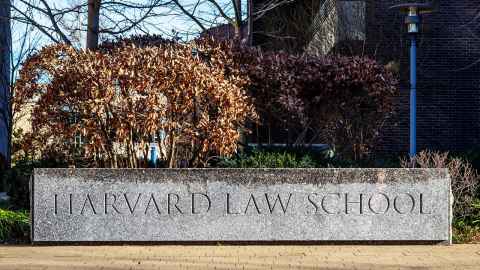Harvard bound: four scholarships fuel constitutional research
26 June 2024
Law alumna Hannah Yang heads to Harvard this August, buoyed by the support of not one but four prestigious scholarships.

Hannah Yang, 28, is Harvard-bound thanks to four significant scholarships.
To her surprise, the University of Auckland alumna was awarded a Georgetti Scholarship, an Ethel Benjamin Scholarship, a Knox Fellowship and an Yvonne Smith Scholarship.
“I applied for several only because I was sure I wouldn’t be awarded all of them, so it was unexpected, and I’m incredibly grateful for the generosity of the various organisations that have supported me,” she says.
Currently a junior barrister at Thorndon Chambers in Wellington, the law scholar graduated with a joint Bachelor of Arts and Laws (Hons) from the University in 2019.
She intends to use her time at Harvard Law School to further study constitutional and democratic theory. This will allow her to consider the bases for legislative and judicial authority, how New Zealand’s unique history affects those justifications, and what this means for legal developments in New Zealand, such as climate litigation and how the Treaty of Waitangi should be incorporated into New Zealand law.
Hannah says greater recognition of te Tiriti as a constitutional document in New Zealand law is long overdue, although there are questions about how such recognition should be effected and whether it’s legitimate for development to continue solely through the courts.
Hannah hopes to contribute meaningfully to Aotearoa’s Treaty jurisprudence and the direction in which the law is headed in the near future.

Learn more about Hannah’s Harvard plans, her Auckland experience and inspirations:
What are you looking forward to about living in Cambridge, MA?
I will be living on campus in the law school residences, so there’s a real risk I don’t see much of Cambridge at all! But otherwise, generally, I’m looking forward to experiencing a winter with actual snow – I hear there will be lots of it.
What are you nervous about?
I’m sure there will be more important things to worry about once I get there, but right now, the logistics of flying 17 hours, moving in, and immediately starting orientation the next day—I’m not sure if I’ll be able to stay awake, but we shall see.
How was your time studying law at Waipapa Taumata Rau, University of Auckland?
University, and particularly law school, was initially a bit of a culture shock for me coming from Mt Roskill, which is very multicultural with low average decile schools, but I was lucky to meet a good group of friends I studied with right throughout law school.
Standout classes that occur to me include jurisprudence, commercial law, contract theory, rights and freedoms, tax, and the medico-legal honours seminar I was in – so a bit of a mix. I also really enjoyed the psychology and philosophy papers from my conjoint arts degree, and while I never intended to work in those areas, I’m glad I studied in them because they’ve been useful to my work in the legal field in an indirect way as well (and also minds and brains are just interesting).
What inspired you to get into law to begin with?
Honestly, I enrolled in law for no deeper reason than because, as a 17-year-old, I liked English at school, I didn’t want to study science, and I was too risk averse to commit to studying for a career in media design/visual arts (which was and still is an interest of mine). At the time, I didn’t know any lawyers and had no idea what they actually did, but it worked out, and now I do!
When did you become interested in the incorporation of te Tiriti o Waitangi into public law in Aotearoa?
I think this is an interest that has concretised during my practice as a junior barrister over the last two and a half years but has roots in my time as a judge’s clerk after graduating.
The incorporation of te Tiriti into our law has been happening for a long time, but it’s become more notable in the last five years or so since the decision of Trans-Tasman Resources Ltd v Taranaki-Whanganui Conservation Board, which was issued by the Supreme Court while I was a clerk there. That case is now often cited for the proposition that legislation is presumed to be interpreted consistently with Te Tiriti. This is very similar to the New Zealand Bill of Rights Act 1990, which enjoys the same interpretive presumption, but that presumption has express legislative basis in s6 of that Act.
Working as a junior barrister in cases that involved Te Tiriti and the Bill of Rights Act has highlighted the emerging parallels between these constitutional documents, which will have interesting and significant implications for (primarily but not exclusively) public law. My interest in the constitutional legitimacy side of this development (i.e. who gets to drive it, and to what extent?) stems from my experience clerking at the Supreme Court and watching judges work.
Media contact:
Sophie Boladeras I Media adviser
M: 022 4600 388
E: sophie.boladeras@auckland.ac.nz